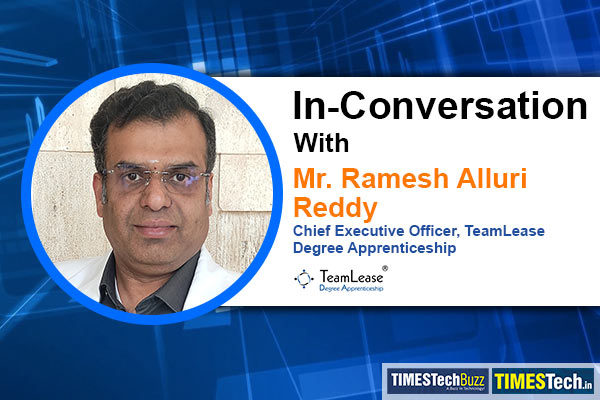Explore how Ramesh Alluri Reddy, CEO of TeamLease Degree Apprenticeship, delves into the transformative power of Generative AI in education, shedding light on its potential to revolutionize learning experiences and skill development.
TimesTech: Could you elaborate on the rapid growth of the global EdTech market and its impact on the future of education?
Mr. Ramesh: For a country to thrive, its youth must have access to quality education. In recent years, there has been a significant revolution in the education industry, especially after the outbreak of COVID-19, which forced the world to adopt virtual learning. Educational technology (EdTech) has played a massive role in this change, providing personalised learning experiences and catering to the diverse needs of students. With the continued evolution of EdTech, it promises to empower the next generation of learners by synergising human expertise with artificial intelligence. The global EdTech market is currently valued at $340 billion, and the projected revenue from online education is expected to reach $166.60 billion by 2024, with a robust 9.48% annual growth rate. Integrating Artificial Intelligence (AI) in education has played a pivotal role in this growth. India, the second-largest e-learning market after the US, is expected to expand from $6 billion to $10 billion by 2025, with K–12 education leading the charge at $2.7 billion.
AI integration has democratised education, enabling inclusive access to quality resources and personalised learning experiences tailored to individual needs. Apprenticeships, degree apprenticeships, and work-integrated learning are poised to lead the future of education and workforce development, especially with AI integration, as they blend practical experiences with academic learning, bridging theory and practice. AI’s pivotal role in apprenticeship education promises transformative outcomes, offering personalised paths, adaptive assessments, and predictive analytics to optimise skill development and enhance learner outcomes. AI-driven virtual mentoring and coaching will ensure real-time support, fostering continuous improvement and innovation. Moreover, AI-driven algorithms facilitate seamless skills matching and job placement, ensuring smooth transitions into the workforce. By harnessing the power of AI, apprenticeship programs are poised to meet the dynamic needs of learners and industries, driving workforce readiness and economic growth in the digital era. The future of EdTech holds immense promise, democratising education, closing learning gaps, and equipping students to tackle future challenges head-on.
TimesTech: How does Generative AI enable personalised learning, and what benefits does it bring to students and educators?
Mr. Ramesh: Generative AI is transforming the education sector by providing adaptive and personalised learning experiences that meet the needs of individual learners. According to recent research by TeamLease Edtech, 64.87% of educators acknowledge the potential benefits of Generative AI in enhancing learning experiences, promoting personalised education, and interactive engagement. Furthermore, 61.60% of educators actively use Generative AI tools for teaching and preparation, indicating significant adoption and perceived benefits in educational delivery and student engagement. AI platforms use advanced algorithms to customise content and adapt to learners’ needs, offering real-time feedback and interaction. By automating administrative tasks, AI frees up educators’ time, allowing them to focus on personalised teaching and mentoring. LLMs offer innovative assessment strategies and continuous feedback loops that improve content and teaching methodologies, enhancing the learning experience.
The technology can promote inclusivity and democratise access to quality education through stakeholder-led initiatives for publicly funded LLMs. For example, applications like Krutim facilitate vernacular content, making higher education and skill development more accessible to native vernacular speakers. The advent of Generative AI marks a pivotal moment in the evolution of education, as it enables personalised learning experiences, enhances engagement, optimises resources, and fosters inclusivity. With its transformative potential, Generative AI is set to revolutionise the education sector in the future.
TimesTech: What are the key regulatory challenges related to Generative AI in education, especially in countries lacking comprehensive national regulations like India?
Mr. Ramesh: Generative AI presents many opportunities and challenges, especially in countries like India, where regulatory frameworks are still evolving, and concerns regarding the proliferation of false information and copyright violations are raised. The integration of Generative AI (GenAI) technology into education encounters significant barriers, including lack of awareness and understanding, technological barriers, resistance to change, ethical and privacy concerns, academic rigour and quality, resource constraints, legal and regulatory considerations, lack of interdisciplinary collaboration, transparency of GenAI systems, potential bias and fairness issues, privacy violations, intellectual property infringements, and security risks.
The policy-makers are tasked with establishing legal certainty while fostering innovation. The recent initiatives by the University Grants Commission (UGC) and the National Education Policy (NEP) in India offer hope in addressing these regulatory challenges. The UGC’s Guidelines for Higher Education Institutions to offer Apprenticeship/Internship-embedded Embedded Degree Programmes provide a structured framework for integrating industry-relevant training into academic curricula. By encouraging active collaboration between academia and industry, these guidelines aim to bridge the gap between theoretical knowledge and practical skills, thereby enhancing the employability of graduates. Moreover, the emphasis on outcome-based learning and the adoption of the Learning Outcome-based Curriculum Framework (LOCF) by HEIs align with the objectives of preparing students for the evolving demands of the workforce. Furthermore, the NEP’s focus on flexibility and innovation in programme design and the incorporation of domain-specific Learning Outcomes for Apprenticeship /Internship Programmes empower HEIs to adapt to the changing educational landscape driven by advancements in AI and technology. By leveraging the UGC and NEP guidelines, academic institutions can not only navigate the regulatory challenges of Generative AI but also harness its transformative potential to foster a future-ready workforce with the requisite skills and competencies.
TimesTech: How do existing regulations in China and the G7 nations compare, and what lessons can India draw from these models for its regulatory framework?
Mr. Ramesh: Navigating the complexities of Artificial Intelligence (AI) regulation is a global challenge, requiring a delicate balance between innovation, ethics, and societal well-being. China’s Interim GAI Measures represent a pioneering effort, enacting comprehensive regulations to foster responsible development of generative AI while safeguarding national interests and individual rights. In contrast, the G7 nations have adopted a collaborative approach, advocating for voluntary codes of conduct and policy frameworks emphasising transparency, accountability, and responsible AI governance. UNESCO’s guidelines further underscore the importance of regulating AI in education, focusing on data privacy and equity.
In the global context, our National Education Policy (NEP) 2020 emerges as a foundational pillar recognising AI’s transformative potential in education and advocating its integration into our education system. We can develop a regulatory framework prioritising innovation, ethics, and societal well-being by emphasising transparency and mandating transparency in AI algorithms and decision-making processes to foster stakeholder trust. The latest report by TeamLease Edtech shows that 87.85% of educators believe the government should monitor and regulate the development and application of AI technologies due to concerns about risks and ethical implications. Primary concerns about Generative AI in education include its potential impact on creativity and critical thinking, traditional learning methods, and an overreliance on technology. Drawing from China’s emphasis on data privacy protection, we can enact robust data protection laws to safeguard individuals’ privacy rights while promoting responsible AI usage. Additionally, we can benefit from the collaborative approach adopted by the G7 nations, engaging stakeholders across academia, industry, and civil society to develop inclusive policies reflecting diverse perspectives. Operationalising regulatory efforts, we can establish dedicated bodies overseeing AI implementation and compliance while investing in capacity-building initiatives to empower stakeholders with the knowledge and skills to navigate AI regulation complexities, ensuring responsible AI adoption. We can shape a future where AI catalyses positive change in education and beyond by aligning with global best practices and tailored regulations to our socio-cultural context.
TimesTech: In practical terms, how does Generative AI in EdTech platforms revolutionise learning experiences, and can you provide specific examples or use cases?
Mr. Ramesh: Generative AI in EdTech platforms is not just a trend; it’s a fundamental shift in how we approach education, driven by compelling data and real-world applications. With an impressive 61.60% of educators actively utilising Generative AI tools for teaching and preparation, it’s evident that these technologies are not merely speculative ventures but integral components of contemporary pedagogy. The success of Generative AI implementation in classrooms rests upon meticulous attention to critical factors. A comprehensive 68.07% of educators advocate for thorough training to ensure effective and ethical utilisation of Generative AI tools. Moreover, 52.63% emphasise the critical importance of integrating these tools seamlessly into existing curricula, while 55.79% stress the necessity of regular assessments to gauge their impact on student learning and teacher efficacy.
At TeamLease Degree Apprenticeship, we recognise the transformative potential of Generative AI in education. Our integrated degree programs, including B.B.A Retail and B.Sc Automotive Mechatronics allows students to engage with cutting-edge technologies while pursuing their academic aspirations. We will soon launch nine exciting diploma courses tailored to meet industry demands across sectors like banking, logistics, retail, automobile and more, providing students with practical skills aligned with workforce requirements. The integration of Generative AI extends far beyond our programs, permeating the fabric of global and Indian EdTech ecosystems. Leading global platforms are seamlessly incorporating ChatGPT into courses, enhancing user engagement and learning outcomes worldwide. Likewise, Indian EdTech giants such as upGrad, Byju, EdZola, and Cuemath leverage Generative AI to deliver hyper-personalised learning experiences. For instance, upGrad’s proprietary LLM and Byju’s suite of AI models (Wiz) exemplify the transformative potential of Generative AI in education. Furthermore, Generative AI presents myriad opportunities for innovation and enhancement in areas, including adaptive learning systems that tailor content to individual student needs, automated assessment tools that provide timely feedback, content creation algorithms that generate interactive learning materials, and virtual tutoring platforms that offer personalised support. By leveraging Generative AI, educators can unlock new avenues for student engagement, creativity, and academic success.
TimesTech: How can ed-tech platforms leverage Generative AI to enhance user engagement and improve learning outcomes?
Mr. Ramesh: Generative AI is a transformative force in education technology, particularly within adaptive learning platforms. Based on the recent survey conducted by TeamLease Ed-tech, nearly half of respondents recognised its positive impact on educator development, underscoring its potential for reshaping apprenticeship programs. For educational institutions and educators, embracing Generative AI can revolutionise apprenticeship initiatives by aligning skill acquisition with industry demands. By harnessing Generative AI, adaptive learning platforms can offer tailored content that reflects real-world scenarios and addresses industry-specific challenges, enriching the learning experiences of apprentices and ensuring their acquisition of directly relevant skills.
Generative AI also enables personalised learning experiences by empowering adaptive learning platforms to analyse individual learner profiles and progress. This customised approach ensures that apprentices receive finely-tuned instruction tailored to their unique needs and skill levels. It proves incredibly beneficial for educational institutions and educators striving to cater to learners with diverse backgrounds and abilities. Additionally, adaptive assessments, fueled by Generative AI, provide real-time feedback and adjust content based on individual performance, fostering a culture of continuous improvement and skill development among apprentices. As Generative AI and adaptive learning converge, educational institutions and educators can adopt a more responsive and agile approach to skills training, equipping learners with the competencies needed to excel in degree, apprenticeship or work-integrated learning programs.















